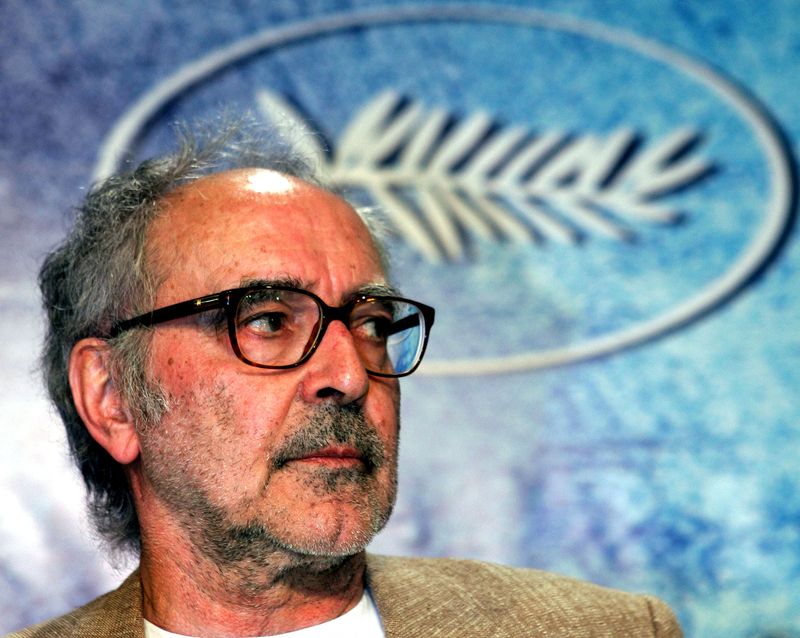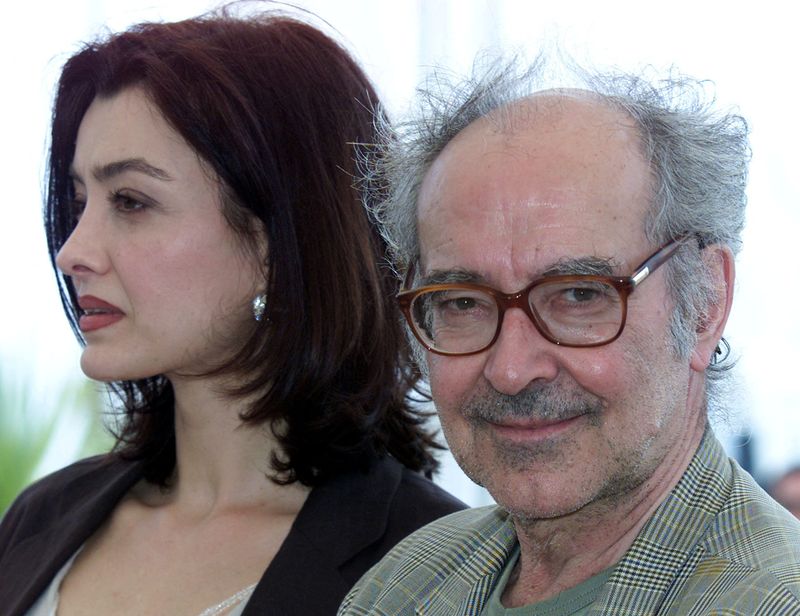By Brian Love
PARIS (Reuters) - Film director Jean-Luc Godard, the godfather of France's New Wave cinema who pushed cinematic boundaries and inspired iconoclastic directors decades after his 1960s heyday, died on Tuesday aged 91, his family and producers said.
Godard was among the world's most acclaimed directors, known for such classics as "Breathless" and "Contempt", which broke with convention and helped kickstart a new way of filmmaking, with handheld camera work, jump cuts and existential dialogue.
"Jean-Luc Godard died peacefully at his home surrounded by loved ones," his wife Anne-Marie Mieville and producers said in a statement published by several French media. Godard will be cremated and there will be no official ceremony, they said.
French daily Liberation, which first reported the news, said Godard chose to end his life through assisted suicide, a practice allowed under Swiss law, citing a person close to the family as saying that "it was his decision and it was important to him that people know about it."
When contacted by Reuters, the family said they would make no further comment on the matter.
For many movie buffs, no praise is high enough: Godard, with his tousled black hair and heavy-rimmed glasses, was a veritable revolutionary who made artists of movie-makers, putting them on a par with master painters and icons of literature.
"A movie should have a beginning, a middle, and an end, but not necessarily in that order," he once said.
Godard was not alone in creating France's New Wave (Nouvelle Vague), a credit he shares with at least a dozen peers including Francois Truffaut and Eric Rohmer, most of them pals from the trendy, bohemian Left Bank of Paris in the late 1950s.
However, he became the poster child of the movement, which spawned offshoots in Japan, Hollywood and, more improbably, in what was then Communist-ruled Czechoslovakia as well as in Brazil.
"Jean-Luc Godard, the most iconoclastic filmmaker of the New Wave, had invented a resolutely modern, intensely free art. We are losing a national treasure, a look of genius," President Emmanuel Macron tweeted.
Brigitte Bardot, who appeared in several of Godard's films, also paid tribute on Twitter (NYSE:TWTR).
"Godard created Contempt and then, breathless, he has joined the firmament of the last great star-makers", Bardot wrote, in a play on the titles of two of the filmmaker's 1960s classics "Contempt", which she starred in, and "Breathless".
Quentin Tarantino, director of 1990s cult films "Pulp Fiction" and "Reservoir Dogs", is among a more recent generation of filmmakers who took up the mantle of the boundary-bending tradition initiated by Godard and his Paris Left Bank cohorts.
Earlier came Martin Scorsese in 1976 with "Taxi Driver", the disturbing neon-lit psychological thriller of a Vietnam veteran turned cabbie who steers through the streets all night with a growing obsession for the need to clean up seedy New York City.
"RIP Jean-Luc Godard, one of the most influential, iconoclastic filmmakers of them all," said film director Edgar Wright. "It was ironic that he himself revered the Hollywood studio filmmaking system, as perhaps no other director inspired as many people to just pick up a camera and start shooting..."
Godard was not universally revered however; some of his sharpest critics included the late Swedish director Ingmar Bergman, himself a trailblazer in European cinema who is perhaps best known for his 1957 films "The Seventh Seal" and "Wild Strawberries".
"I've never gotten anything out of (Godard's) movies. They have felt constructed, faux intellectual and completely dead. Cinematographically uninteresting and infinitely boring," Bergman once said in an interview, according to his foundation's website.
NEW WAVE, NEW WAYS
Godard was born into a wealthy Franco-Swiss family on Dec. 3, 1930 in Paris's plush Seventh Arrondissement. His father was a doctor, his mother the daughter of a Swiss man who founded Banque Paribas, then an illustrious investment bank.
This upbringing contrasted with his later pioneering ways. Godard fell in with like-minded folk whose dissatisfaction with humdrum movies that never strayed from convention sowed the seeds of a breakaway movement which came to be called the Nouvelle Vague.
With its more forthright, offbeat approach to sex, violence and its explorations of the counter-culture, anti-war politics and other changing mores, the New Wave was about innovation in the making of movies.
Godard was one of the most prolific of his peers, producing dozens of short- and full-length films over more than half a century from the late 1950s.
"Sometimes reality is too complex. Stories give it form," Godard said.
CIGARS AND COFFEE
Godard spent the final years of his life in Rolle, a Swiss village on the banks of Lake Geneva - a region favoured by celebrities keen to avoid the spotlight.
"We would come across him here, he had a very unique silhouette, he was always smoking his iconic cigar and he used to drink his coffee in a restaurant on the main street," said Rolle Mayor Monique Pugnale.
"We use to see him almost every week, he came to buy a cookie," said Nadine von Wattenwyl, who runs a grocery store. "We knew already what he wanted, so we were ready."

Most of Godard's most influential and commercially successful films came in the 1960s, including "Vivre Sa Vie" (My Life to Live), "Pierrot le Fou", "Two or Three Things I Know About Her" and "Weekend".
He switched to directing films steeped in leftist, anti-war politics through the 1970s before returning to a more commercial mainstream. Recent works, however - among them "Goodbye to Language" in 2014 and "The Image Book" in 2018 - were more experimental and slimmed the audience largely to Godard geeks.
